Survey Report
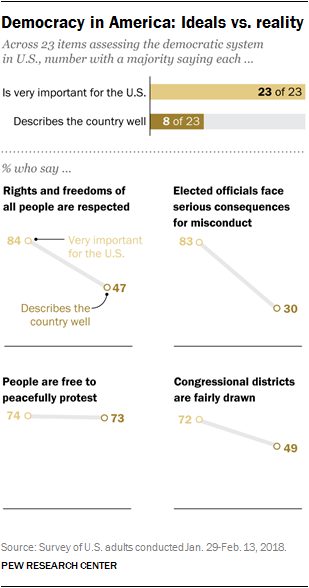
At a time of growing stress on democracy around the world, Americans generally agree on democratic ideals and values that are important for the United States. But for the most part, they see the country falling well short in living up to these ideals, according to a new study of opinion on the strengths and weaknesses of key aspects of American democracy and the political system.
The public’s criticisms of the political system run the gamut, from a failure to hold elected officials accountable to a lack of transparency in government. And just a third say the phrase “people agree on basic facts even if they disagree politically” describes this country well today.
The perceived shortcomings encompass some of the core elements of American democracy. An overwhelming share of the public (84%) says it is very important that “the rights and freedoms of all people are respected.” Yet just 47% say this describes the country very or somewhat well; slightly more (53%) say it does not.
Despite these criticisms, most Americans say democracy is working well in the United States – though relatively few say it is working very well. At the same time, there is broad support for making sweeping changes to the political system: 61% say “significant changes” are needed in the fundamental “design and structure” of American government to make it work for current times.
The public sends mixed signals about how the American political system should be changed, and no proposals attract bipartisan support. Yet in views of how many of the specific aspects of the political system are working, both Republicans and Democrats express dissatisfaction.
To be sure, there are some positives. A sizable majority of Americans (74%) say the military leadership in the U.S. does not publicly support one party over another, and nearly as many (73%) say the phrase “people are free to peacefully protest” describes this country very or somewhat well.
In general, however, there is a striking mismatch between the public’s goals for American democracy and its views of whether they are being fulfilled. On 23 specific measures assessing democracy, the political system and elections in the United States – each widely regarded by the public as very important – there are only eight on which majorities say the country is doing even somewhat well.
The new survey of the public’s views of democracy and the political system by Pew Research Center was conducted online Jan. 29-Feb. 13 among 4,656 adults. It was supplemented by a survey conducted March 7-14 among 1,466 adults on landlines and cellphones.
Among the major findings:
Mixed views of structural changes in the political system. The surveys examine several possible changes to representative democracy in the United States. Most Americans reject the idea of amending the Constitution to give states with larger populations more seats in the U.S. Senate, and there is little support for expanding the size of the House of Representatives. As in the past, however, a majority (55%) supports changing the way presidents are elected so that the candidate who receives the most total votes nationwide – rather than a majority in the Electoral College – wins the presidency.
A majority says Trump lacks respect for democratic institutions. Fewer than half of Americans (45%) say Donald Trump has a great deal or fair amount of respect for the country’s democratic institutions and traditions, while 54% say he has not too much respect or no respect. These views are deeply split along partisan and ideological lines. Most conservative Republicans (55%) say Trump has a “great deal” of respect for democratic institutions; most liberal Democrats (60%) say he has no respect “at all” for these traditions and institutions.
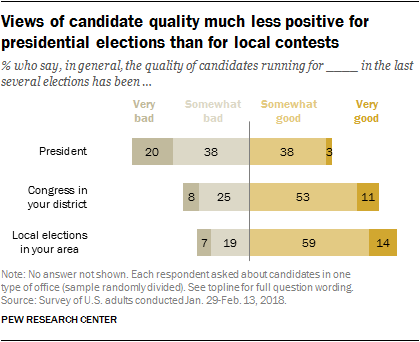
Government and politics seen as working better locally than nationally. Far more Americans have a favorable opinion of their local government (67%) than of the federal government (35%). In addition, there is substantial satisfaction with the quality of candidates running for Congress and local elections in recent elections. That stands in contrast with views of the recent presidential candidates; just 41% say the quality of presidential candidates in recent elections has been good.
Few say tone of political debate is ‘respectful.’ Just a quarter of Americans say “the tone of debate among political leaders is respectful” is a statement that describes the country well. However, the public is more divided in general views about tone and discourse: 55% say too many people are “easily offended” over the language others use; 45% say people need to be more careful in using language “to avoid offending” others.
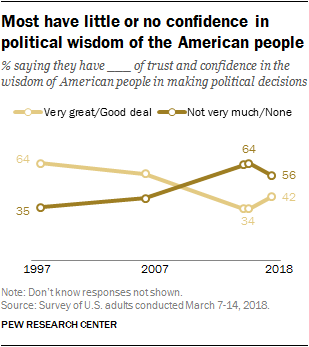
Americans don’t spare themselves from criticism. In addressing the shortcomings of the political system, Americans do not spare themselves from criticism: Just 39% say “voters are knowledgeable about candidates and issues” describes the country very or somewhat well. In addition, a 56% majority say they have little or no confidence in the political wisdom of the American people. However, that is less negative than in early 2016, when 64% had little or no confidence. Since the presidential election, Republicans have become more confident in people’s political wisdom.
Cynicism about money and politics. Most Americans think that those who donate a lot of money to elected officials have more political influence than others. An overwhelming majority (77%) supports limits on the amount of money individuals and organizations can spend on political campaigns and issues. And nearly two-thirds of Americans (65%) say new laws could be effective in reducing the role of money in politics.
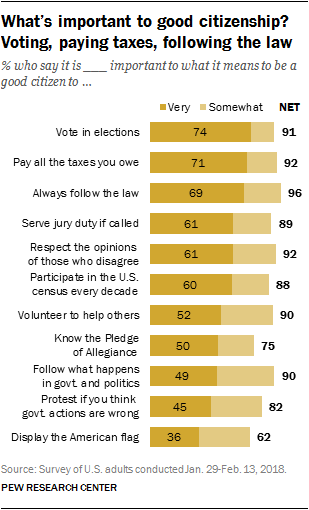
Varying views of obligations of good citizenship. Large majorities say it is very important to vote, pay taxes and always follow the law in order to be a good citizen. Half of Americans say it is very important to know the Pledge of Allegiance, while 45% say it is very important to protest government actions a person believes is wrong. Just 36% say displaying the American flag is very important to being a good citizen.
Most are aware of basic facts about political system and democracy. Overwhelming shares correctly identify the constitutional right guaranteed by the First Amendment to the Constitution and know the role of the Electoral College. A narrower majority knows how a tied vote is broken in the Senate, while fewer than half know the number of votes needed to break a Senate filibuster. (Take the civics knowledge quiz.)
Democracy seen as working well, but most say ‘significant changes’ are needed
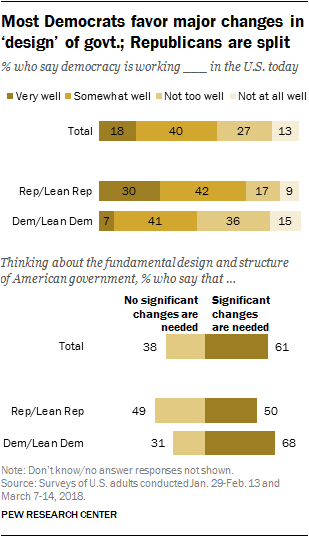
In general terms, most Americans think U.S. democracy is working at least somewhat well. Yet a 61% majority says “significant changes” are needed in the fundamental “design and structure” of American government to make it work in current times. When asked to compare the U.S. political system with those of other developed nations, fewer than half rate it “above average” or “best in the world.”
Overall, nearly six-in-ten Americans (58%) say democracy in the United States is working very or somewhat well, though just 18% say it is working very well. Four-in-ten say it is working not too well or not at all well.
Republicans have more positive views of the way democracy is working than do Democrats: 72% of Republicans and Republican-leaning independents say democracy in the U.S. is working at least somewhat well, though only 30% say it is working very well. Among Democrats and Democratic leaners, 48% say democracy works at least somewhat well, with just 7% saying it is working very well.
More Democrats than Republicans say significant changes are needed in the design and structure of government. By more than two-to-one (68% to 31%), Democrats say significant changes are needed. Republicans are evenly divided: 50% say significant changes are needed in the structure of government, while 49% say the current structure serves the country well and does not need significant changes.
The public has mixed evaluations of the nation’s political system compared with those of other developed countries. About four-in-ten say the U.S. political system is the best in the world (15%) or above average (26%); most say it is average (28%) or below average (29%), when compared with other developed nations. Several other national institutions and aspects of life in the U.S. – including the military, standard of living and scientific achievements – are more highly rated than the political system.
Republicans are about twice as likely as Democrats to say the U.S. political system is best in the world or above average (58% vs. 27%). As recently as four years ago, there were no partisan differences in these opinions.
Bipartisan criticism of political system in a number of areas
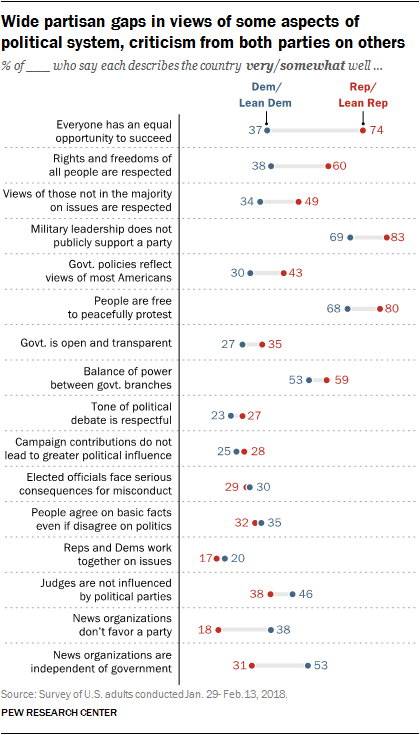
Majorities in both parties say “people are free to peacefully protest” describes the U.S. well. And there is bipartisan sentiment that the military leadership in the U.S. does not publicly favor one party over another.
In most cases, however, partisans differ on how well the country lives up to democratic ideals – or majorities in both parties say it is falling short.
Some of the most pronounced partisan differences are in views of equal opportunity in the U.S. and whether the rights and freedoms of all people are respected.
Republicans are twice as likely as Democrats to say “everyone has an equal opportunity to succeed” describes the United States very or somewhat well (74% vs. 37%).
A majority of Republicans (60%) say the rights and freedoms of all people are respected in the United States, compared with just 38% of Democrats.
And while only about half of Republicans (49%) say the country does well in respecting “the views of people who are not in the majority on issues,” even fewer Democrats (34%) say this.
No more than about a third in either party say elected officials who engage in misconduct face serious consequences or that government “conducts its work openly and transparently.” Comparably small shares in both parties (28% of Republicans, 25% of Democrats) say the following sentence describes the country well: “People who give a lot of money to elected officials do not have more political influence than other people.”
Fewer than half in both parties also say news organizations do not favor one political party, though Democrats are more likely than Republicans to say this describes the country well (38% vs. 18%). There also is skepticism in both parties about the political independence of judges. Nearly half of Democrats (46%) and 38% of Republicans say judges are not influenced by political parties.
Partisan gaps in opinions about many aspects of U.S. elections
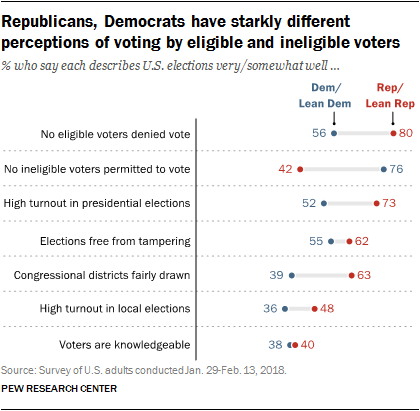
For the most part, Democrats and Republicans agree about the importance of many principles regarding elections in the U.S.
Overwhelming shares in both parties say it is very important that elections are free from tampering (91% of Republicans, 88% of Democrats say this) and that voters are knowledgeable about candidates and issues (78% in both parties).
But there are some notable differences: Republicans are almost 30 percentage points more likely than Democrats to say it is very important that “no ineligible voters are permitted to vote” (83% of Republicans vs. 55% of Democrats).
And while majorities in both parties say high turnout in presidential elections is very important, more Democrats (76%) than Republicans (64%) prioritize high voter turnout.
The differences are even starker in evaluations of how well the country is doing in fulfilling many of these objectives. Republicans are more likely than Democrats to say that “no eligible voters are prevented from voting” describes elections in the U.S. very or somewhat well (80% vs. 56%). By contrast, more Democrats (76%) than Republicans (42%) say “no ineligible voters are permitted to vote” describes elections well.
Democrats – particularly politically engaged Democrats – are critical of the process for determining congressional districts. A majority of Republicans (63%) say the way congressional voting districts are determined is fair and reasonable compared with just 39% of Democrats; among Democrats who are highly politically engaged, just 29% say the process is fair.
And fewer Democrats than Republicans consider voter turnout for elections in the U.S. – both presidential and local – to be “high.” Nearly three-quarters of Republicans (73%) say “there is high voter turnout in presidential elections” describes elections well, compared with only about half of Democrats (52%).
Still, there are a few points of relative partisan agreement: Majorities in both parties (62% of Republicans, 55% of Democrats) say “elections are free from tampering.” And Republicans and Democrats are about equally skeptical about whether voters are knowledgeable about candidates and issues (40% of Republicans, 38% of Democrats).